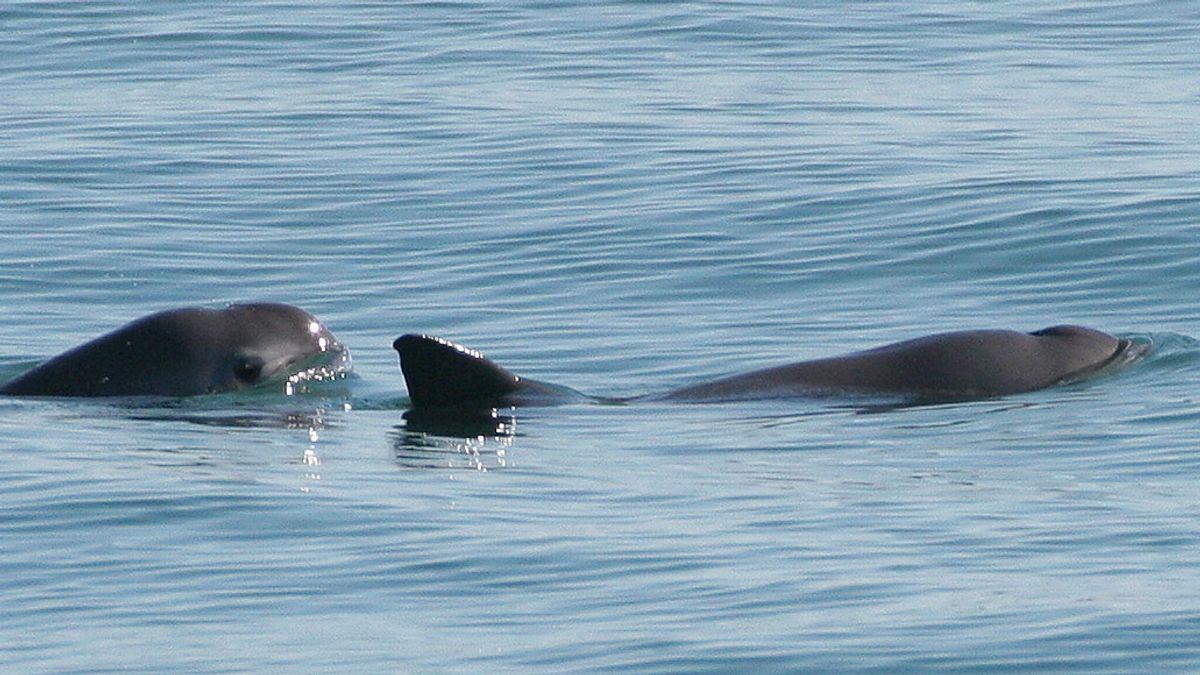JAKARTA - The most comprehensive genetic assessment to date of the vaquita, the world's rarest marine mammal, offers a glimmer of hope that this family of small tropical dolphins native to the Gulf of California, Mexico, can avoid extinction even though its population is reduced to around 10.
Researchers said last week genomic data from 20 vaquita showed that although the species has low genetic diversity, DNA differences between individuals, the number of potentially harmful mutations that could compromise their survival through inbreeding is quite low.
The vaquita, first described by scientists in 1958 and now considered critically endangered, is the smallest cetacean, a group that includes whales, dolphins and porpoises, reaching about 5 feet (1.5 meters) in length and 120 pounds in weight. 54 kg). Its torpedo-shaped body is gray above and white below with dark circles around the eyes.
Computational simulations carried out by the researchers to predict the risk of extinction show that the vaquita, whose population has fallen more than 99 percent since the early 20th century due to human activity, has a high chance of recovering.
The condition, if the gill nets are completely removed from their habitat. Gillnets, large curtains of net hanging over the water, are used to catch fish and shrimp but have killed many vaquitas that have become entangled and drowned.

"Our main finding is that the vaquita was not destined for extinction by genetics, as some are beginning to assume," said UCLA doctoral student in ecology and evolutionary biology Christopher Kyriazis, lead author of the study published in the journal Science.
"This finding is important, because it provides hope for species that are on the verge of extinction, many of which are now being abandoned," he said.
A particular threat is the hunting of gillnets from an endangered fish called the totoaba. Totoaba's swim bladder, which is claimed to be a fertility enhancer, is prized in China.
"Dried totoaba is traded on the black market in China for traditional medicinal purposes, and is more expensive than cocaine," explains study co-author Phillip Morin, a research geneticist at the US National Oceanic and Atmospheric Administration's Southwest Fisheries Science Center.
Vaquita, still reproducing despite their small numbers, inhabit the northern Gulf of California, also called the Sea of Cortez, between mainland Mexico and the Baja peninsula.
"Gillnet fishing in vaquita habitat has been banned, but the ban has not been enforced and vaquitas continue to die in the nets," said study co-author Jacqueline Robinson, a postdoctoral researcher at the University of California, San Francisco Institute for Human Genetics.
The first population estimate, carried out in 1997, found there were about 570 vaquita. The population has since declined by about 50 percent each year.

The researchers measured the genetic health of the species, which diverged evolutionarily from its closest relatives about 2.5 million years ago, by examining samples from 20 individuals obtained between 1985 and 2017, mostly archived from dead vaquitas.
One concern with such a small population is that the inevitable interbreeding between closely related individuals could increase mutations that are damaging and harmful to the survival of the species.
Genomic data show the vaquita population had been relatively small, about 5,000 individuals, for hundreds of thousands of years before the destruction caused by human activities, making low genetic diversity a natural feature of the species.
It also shows that there is relatively little inbreeding among vaquitas and very few harmful recessive mutations. Can cause birth defects during inbreeding that endanger species survival, lower than the 11 other cetacean species assessed, including the blue whale.
One species of cetacean appears to have been driven to extinction by humans in recent decades: the baiji, or Chinese river dolphin.
"Because of their shy nature, very little is known about the vaquita," Robinson said.
"This species is in danger of extinction before we even fully know what we are missing, and nothing can replace it once it becomes extinct."
The English, Chinese, Japanese, Arabic, and French versions are automatically generated by the AI. So there may still be inaccuracies in translating, please always see Indonesian as our main language. (system supported by DigitalSiber.id)













